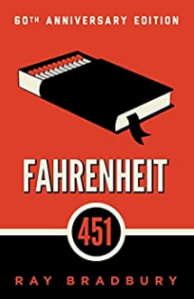(Re-)Reading: “Fahrenheit 451” by Ray Bradbury
Fahrenheit 451, 60th Anniversary Edition 
by Ray Bradbury
My rating: 5 out of 5 stars
With a little free time in the summer but no books on my shelf that I wanted to dive into, I made the unusual decision in late May to go down to my kids’ rooms and look on their shelves for something to read. There, among the dilapidated classroom-use paperbacks and untouched YA novels was the copy of Fahrenheit 451 that I had given my teenage daughter a few Christmases ago. Perhaps I was being too literary in my hope that she would experience this classic novel whose plot centers around a dystopian society where books are forbidden and everyone submerges their humanity in a mire of screen media, sports, technology, and drugs. It should sound familiar, if a bit extreme, I thought. Unfortunately, the book has remained in pristine condition, without so much as a bent-back cover.
So, I picked it up and carried it on one of our outings to the lake. In an afternoon, I devoured about half of it – I had forgotten how short the novel is – and one morning about a week later, I finished it. It usually aggravates me when anyone reads a book (or sees a show or movie) and begins to proclaim, “Everyone should read this.” But in this case . . . in 2023 America . . . everyone should read this. A lot of attention is heaped on the novel 1984, because of the constant surveillance portrayed in the story and its similarity to our current obsession with having cameras everywhere, but Fahrenheit 451 deserves some of that attention, too. For example, we have Montag’s wife Mildred, an ultra-satisfied automaton who suppresses her humanity by overdosing on sleeping pills, surrounding herself with the noise of a custom-made screen-media “family,” and sometimes driving around town at outrageous speeds. As Montag emerges from his societally induced coma brought on by severe forms of groupthink, she is his main detractor, resisting even the suggestion that she embrace her humanity rather than drown it. As another example, there is Beatty’s speech in the couple’s home, when he tells them that the emphasis on athletics over academics was meant to indoctrinate people into abandoning critical thought in fervor of physical exhilaration. Sound familiar? It should, especially the aspect of story about altering the historical narrative to have a culture that forgets how things once were.
Ultimately, the solution that Bradbury infers here suits my sensibility. The heroes here are intellectuals, the professors who had worked in humanities departments but who had to take to the woods where they enacted a unique plan for preserving the world’s best ideas. I was also pleased that Montag’s small piece of the puzzle was Ecclesiastes, which is my favorite book of the Bible. In the end, Bradbury doesn’t give us an easy peace, though he does point toward real hope, which will come in the form of refusing to cooperate with a culture of immediate gratification and brain candy.



